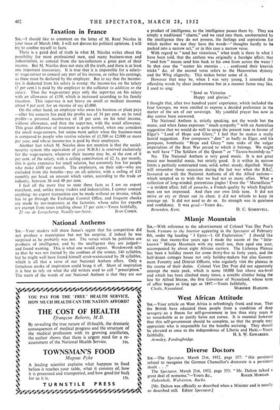National Anthems
SIR,—Your readers will share Janus's regret that his competition did not produce a masterpiece but not his surprise, if indeed he was surprised as he probably was not. The verses which he publishes are products of intelligence, and by the intelligence they are judged— and found wanting. This is what one would expect. Wordsworth tells us that he was not fretted by the confines of the sonnet, 140 syllables, but he might well have found himself strait-waistcoated by 38 syllables, which is all that a verse of our National Anthem offers. Only a fortuitous stroke of inspiration could bring it off. Short of inspiration it is best to rely on what the old writers used to call "prescription." The merit of the words of our National Anthem is that they are not a product of intelligence, so the intelligence passes them by. They are simply a traditional "charm," and we read into them, unobstructed by the intelligence they do not possess, the feelings and aspirations for which neither we nor they have the words—" thoughts hardly to be packed into a narrow act," or in this case a narrow verse.
• With regard to "tend her victorious," what truth is there in what I have been told, that the anthem was originally a JacoNte affair; that "send him" means send him back to his own from across the water ? In that case the "scatter his enemies . . . confound their knavish tricks" &c. of the second verse refers to the Hanoverian dynasty and the Whig oligarchy. This makes better sense of it.
However that may be, when I was very young, I amended the offending words by sheer inadvertence but in a manner Janus may like. I used to sing:
"Send us Victorias Happy and glorias."
I thought that, after two hundred years' experience, which included the four Georges, we were entitled to express a decided preference in the matter of the sex of our sovereign. My youthful prayer has now in due course been answered.
The National Anthem is, strictly speaking, not the words but the music, and when Janus expresses "much sympathy" with an Australian suggestion that we would do well to scrap the present tune in favour of Elgar's "Land of Hope and Glory," I feel that he makes a really horrid suggestion. Few composers " date " as badly as Elgar, and his pompous, bombastic "Hope and Glory" tune reeks of the vulgar imperialism of the Boer War period to which it belongs. We might as well have "The Soldiers of the Queen" or " Tarara-boombdy-ay."
No. The National Anthem is very good music. It is not great music nor beautiful music, but strictly good. It is within its narrow limits a perfectly constructed tune, solid, sober, steady, dignified. Many will remember those occasions during the last war when the B.B.C. favoured us with the National Anthems of all the Allied nations— which tempted us to wish that we had not so many allies. What a collection of long-winded, pretentious jingles ! Even the " Marseillaise" --a strident affair, full, of panache, a French quality by which English- men are not impressed. And then our own little tune. It did not strive or cry or thrust out its chest; it did not whistle to keep its courage up. It did not need to do so. Its strength was in quietness and confidence. It was good.—Yours &c.,


































 Previous page
Previous page